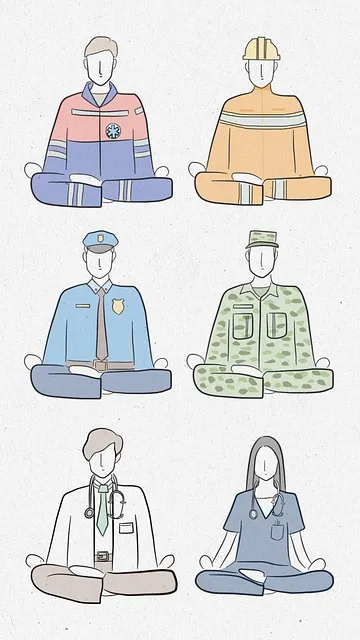Kaiser in Lone Tree prioritizes cultural competency in its comprehensive Inpatient Mental Health Services. By understanding diverse patient backgrounds, beliefs, and healing practices, healthcare providers offer personalized support through workshops and evidence-based treatments, improving patient outcomes and reducing barriers to care. Lone Tree's holistic training program enhances provider resilience and communication, fostering a culturally sensitive environment that aligns with industry goals for effective mental health care.
Healthcare provider cultural competency training is essential in today’s diverse society. Understanding cultural nuances improves patient care, especially within specialized services like inpatient mental health. This article explores these critical topics: the significance of cultural competency, an overview of Kaiser’s inpatient mental health services, Lone Tree’s innovative training approach, and the benefits and implementation strategies for healthcare providers to enhance their practice.
Discover how organizations like Lone Tree are revolutionizing patient experiences by fostering cultural awareness, particularly in the realm of Kaiser’s inpatient mental health services.
- Understanding Cultural Competency in Healthcare: Why It Matters
- Kaiser's Inpatient Mental Health Services: An Overview
- Lone Tree's Approach to Cultural Competency Training
- Benefits and Implementation Strategies for Healthcare Providers
Understanding Cultural Competency in Healthcare: Why It Matters

In today’s diverse healthcare landscape, cultural competency is no longer an optional aspect but a necessity. It refers to the ability to understand and appreciate cultural differences in patients and communities, enabling healthcare providers to deliver more personalized and effective care. This is especially crucial for organizations like Kaiser in Lone Tree, where inpatient mental health services play a significant role. By recognizing and respecting diverse cultural backgrounds, beliefs, and values, healthcare professionals can create an inclusive environment that fosters trust and improves patient outcomes.
For instance, understanding the unique emotional healing processes and stress management techniques valued by different cultures can significantly impact treatment success. This knowledge equips providers with the skills to offer tailored support, such as those provided in Stress Management Workshops offered by various organizations. Moreover, cultural competency helps address barriers to care, ensuring that all patients feel confident in seeking mental health services, ultimately enhancing overall well-being.
Kaiser's Inpatient Mental Health Services: An Overview

In Lone Tree, Kaiser possesses a robust Inpatient Mental Health Services department, offering comprehensive care for individuals experiencing severe mental health crises. These services are designed to provide a safe and supportive environment where patients can receive intensive treatment and therapy. The program incorporates various evidence-based practices and Stress Reduction Methods to address a range of psychiatric disorders.
Beyond clinical care, Kaiser’s inpatient unit fosters self-awareness exercises and encourages patient participation in their mental health policy analysis and advocacy. Through group sessions and individual counseling, patients gain valuable insights into managing their conditions effectively. This holistic approach ensures that individuals not only receive immediate support but also develop the skills needed for long-term mental well-being.
Lone Tree's Approach to Cultural Competency Training

Lone Tree takes a comprehensive approach to cultural competency training, recognizing that healthcare providers need to be equipped with effective communication strategies and burnout prevention techniques in order to serve diverse patient populations, including those with inpatient mental health needs. Their program is designed to foster an understanding of different cultural perspectives, values, and belief systems, ensuring that every patient receives respectful, culturally sensitive care.
In this training, Lone Tree emphasizes the importance of stress management workshops within the organization. By equipping healthcare providers with tools for managing their own stress levels, the organization aims to enhance resilience and improve overall well-being. This, in turn, allows providers to be more present and engaged during patient interactions, thereby improving care delivery outcomes, especially when addressing complex mental health issues like those encountered at Kaiser’s inpatient facilities.
Benefits and Implementation Strategies for Healthcare Providers

Healthcare provider cultural competency training offers numerous benefits that can significantly enhance patient care and satisfaction. By promoting understanding and appreciation for diverse cultures, healthcare providers can improve communication, reduce miscommunication, and provide more personalized treatment plans. This is particularly relevant in areas like Lone Tree, where Kaiser has a robust inpatient mental health facility catering to a diverse population. Cultural competency training equips providers with the skills to navigate complex patient needs, ensuring that every individual receives respectful and effective care.
Implementing cultural competency programs requires strategic approaches. One effective strategy involves incorporating self-awareness exercises to help providers recognize their own biases and limitations. The Mind Over Matter Principles can guide these exercises, fostering a mindset shift towards empathy and understanding. Additionally, regular workshops and ongoing educational sessions can keep these skills sharp, addressing potential burnout prevention concerns that are common among healthcare professionals. These strategies collectively contribute to creating a more inclusive and effective healthcare environment, aligning with the goals of both Kaiser and the broader healthcare industry.
Cultural competency training is a game-changer in healthcare, as evidenced by programs like Kaiser’s inpatient mental health services. Lone Tree’s innovative approach emphasizes the importance of understanding diverse cultural backgrounds to enhance patient care. By implementing tailored training strategies, healthcare providers can overcome challenges and improve outcomes for all patients, regardless of their cultural identity. This comprehensive guide highlights the benefits and offers practical implementation tips, ensuring that professionals in the field are equipped to deliver exceptional, culturally sensitive care.






